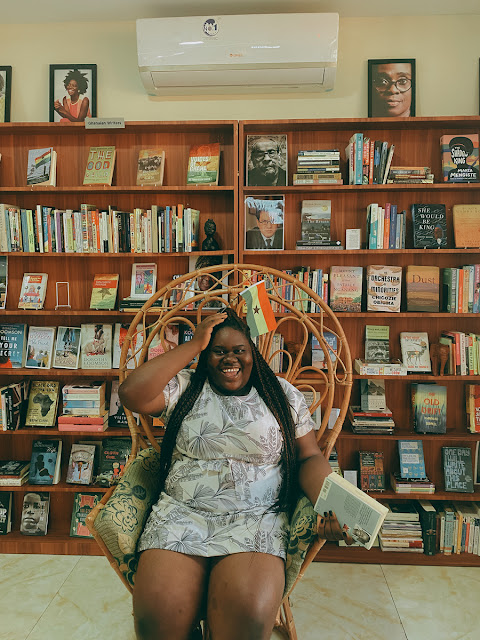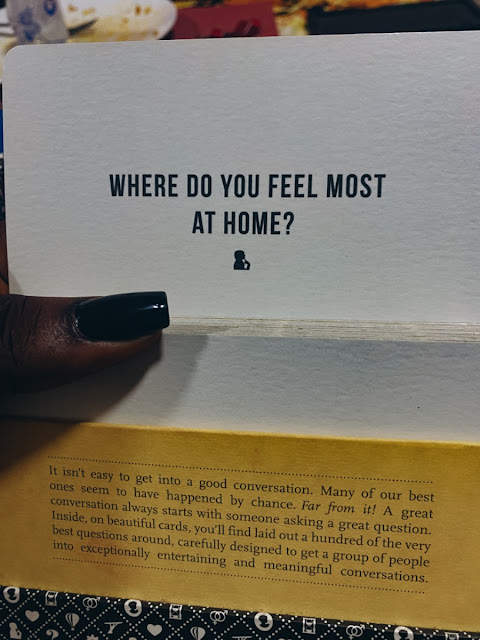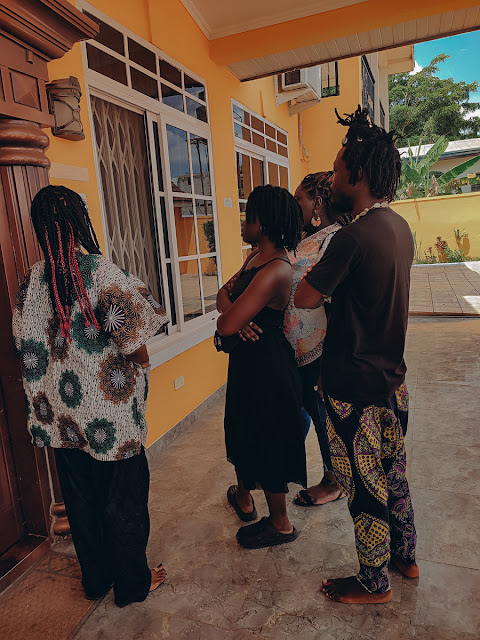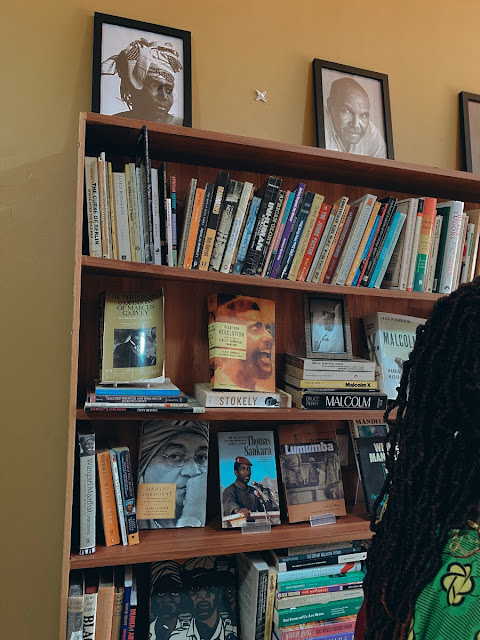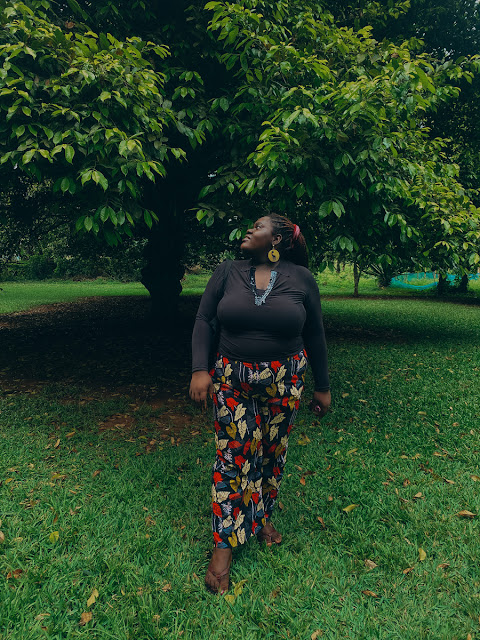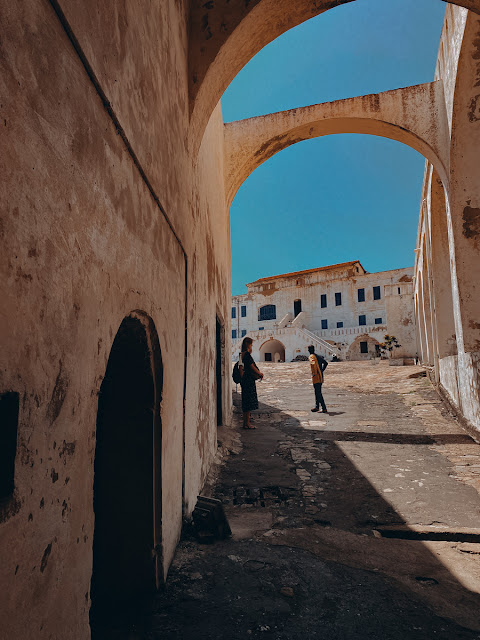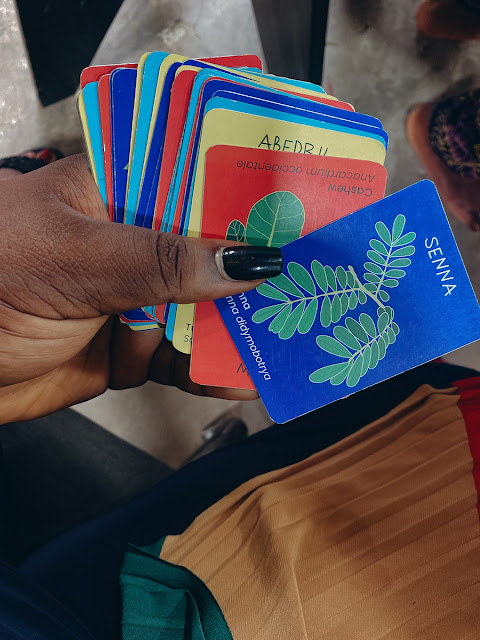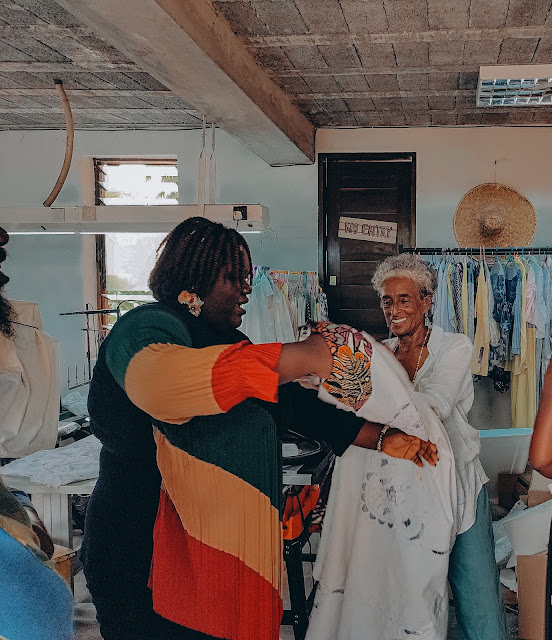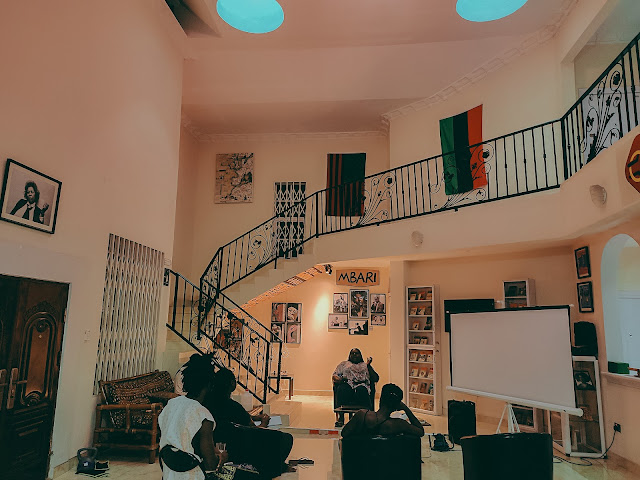Friday, 5 January 2024
TIME AND CHANCE: REFLECTING ON MY RESIDENCY AT THE LIBRARY OF AFRICA AND THE AFRICAN DIASPORA
I think of my residency at The Library Of Africa And The African Diaspora (LOATAD) in terms of time, possibility and perfect chance. I think of it as divine clocking; one that has ticked its way into changing my life, literally. Time started doing its thing when I submitted my LOATAD application less than 10 minutes to the deadline. Life had made me forget the timeline after the open call. I only realized the deadline had reached when a writer friend asked if I had already sent in my application.
I tried to get into LOATAD in 2022 and was unsuccessful. So on this second try, I sat in my parents home panicking and considering not submitting because I could not possibly craft a worthy application in less than 24 hours. I say to everyone who has asked me how I got into LOATAD that God whispered an ingenious idea to me in the middle of my finicky and I ran with it in doubt and pleading faith. Typing as fast as my fingers could manage.
In my letter of motivation, I write, “I need time and space away from the noise, demand and familiarity of home to give my writing a new chance.” and I mean it. The year had been tough and I could not, as I had done in the past, mine this toughness into my writing. Everything around me had a stifling sameness and I wanted to do a new thing with my writing. I knew LOATAD; this brimming hub of books, culture, history and sheer African possibility was going to offer me this newness. You can imagine my animation when I refreshed my email on a hot Friday morning to see “Congratulations on your successful 2023 WAW Residency application!” That I did not open that email immediately but instead ran out of my room, fell to the floor and screamed the whole building down for about 10 straight minutes is a gross understatement.
When I collected myself, I told everyone who mattered to me that the stunningly unthinkable had happened. That my writing, this thing I often wonder if I really know how to do is taking me out of my home country for the very first time.
Sometimes all a writer needs is a chance. LOATAD gave me this chance. LOATAD is the reason I entered an airplane and saw the clouds up close for the first time in my life. The reason I lived in a new country, met new people, read new books and ate new food for a whole month. LOATAD is the reason I am now bold enough to write essays about my environment and self in the most distinct way possible.
My residency started the moment I landed in Kotoka International Airport, Accra. James, a very kind and thoughtful driver was sent to pick me up from the airport. In the minutes he drove me to LOATAD we talked about the people, air, politics, education and diversity in both our countries. I asked questions about Ghana and he answered in an effusively calm and honest tone, delivering both criticism and patriotism in a way that influenced me to try and do the same. In that car ride I learnt that Ghana was more than this unitary systemized nation we were taught about in secondary school government classes - that it was in fact an ethnically diverse country with a radical political drive and a thriving culture.
The first person I saw when I arrived at LOATAD was Seth Avusuglo, Head of LOATAD Physical, a.k.a our residency manager, the one who had given us an orientation via zoom, the one who made sure my trip from Ebonyi, Nigeria to Accra, Ghana was seamless.
Seth showed me to my room and told me that Amanda Thomson from the just concluded Here and Now Writing Residency programme stayed in this room, that it was from here she wrote about birds and nature and everything in between, that it will be from this room that I would do the same with my writing. I think intention informs the finest kinds of writing. I would even argue that it produces the best kind. Seth understood my writing intentions enough to put me in a room that established precedent for this new idea I was exploring. I will always remember this with fondness and gratitude.
I sat in that room, prayed for some minutes and went down to eat dinner with my fellow residents. I might need to write another essay to describe the good food at LOATAD. But just know that Chef Vida did not use our stomach to play and for this I am thankful. Our first dinner together was not as awkward as I expected. Everyone was warm and eager and cool. We played card games over noodles and eggs. We laughed. We quizzed each other. We cheered.
There was the unassuming, brilliant and mind-blowingly beautiful Tahnia who had given me the warmest hug when I mentioned my flight was stressful. There was Ese, an ebony dazzle of deep witted literary charisma. Kwame who spoke lots of Twi, and whose Akan philosophy made him act like an ancestor. Jeff who was not part of our cohort, but whose visits became an excellent addition to it. Then there was Akumbu; LOATAD’s publications manager, whom I consider the warmth that nudged us all into a kind of comfort. We all loosened up during the card games and talked and talked and went to bed late.
The next morning Seth gave us a tour of the Library. Everything at LOATAD means something. The posters of books, the placement of pictures, the arrangement of chairs, the organization of books, the positioning of lighting, the documentaries playing in the background etc. It was during the tour that I fully understood the efficacy of where I was, and what it would continue to mean for my future artistic endeavors. I was limitlessly surrounded by literature and I could swim in all its glory.
The best part about being surrounded by books at the residency was that I did not have to figure out what book to read all by myself. There were recommendations from Seth, who knew a ton of things about every book, word from my fellow residents about their excitement, curiosity or criticism of a book, then there were, believe it or not, whispers from the books themselves calling you and pulling you in, even as you sit or walk casually in the library.
If all LOATAD did was open its doors for us to come in and read and write it would have been more than enough but the opportunity this residency affords transcends just reading and writing. The thing is, the Library Of Africa And The African Diaspora is not just a library, it is a movement. Meaning you will discover new and powerful parts of your work here, meaning your work will take rooted and meaningful shape here, meaning you will be able to visit places of interest, and talk to people who have done and are doing transgenerational work. Meaning you will have no choice but to think of your body of work as an entity, as something capable of doing unprecedented things on the continent of Africa and beyond. We had a workshop with the renowned publisher and editor Ms Sarah Odedina about navigating the publishing industry as an African writer, it was insightful. The excitement and interest she showed when I introduced myself and my work has filled me with so much hope and great promise.
I essentially went to LOATAD to write a series of vignettes on leaves. Had I not visited the Aburi Gardens and touched the trees and leaves myself, I would not have been able to write the kind of pieces I wrote. Would not have been able to make my fellow residents admit to never looking at the leaves I described the same way again. There is an inside joke about Nchuanwu leaves among us now. I packed the leaves with so much emotion, it started to mean many things.
We visited the Nketia Archives of the Institute of African studies in the university of Ghana and the first thing Aunty Judith said when she saw us was “Look at all this Africanness in you!” with her bright, perfect open toothed smile. It was a brief but empowering moment. She spoke so masterfully about archiving, about the preservation of audio visual collections at Nketia archives, about the need for digitization of audio visual materials and how important it is for posterity, for heritage, for culture, for memory, for us. We talked about music and art and literature too. I left knowing that my work, everything I do, was too important to be lost, too important to not be preserved.
The drive through James Town was to see people existing, living. To see monuments and buildings, to witness a history so present in the evolution of a place. The visit to Cape Coast and the Elmina Castle was to see where things happened, to understand the extent of the crime and wickedness that was slavery and to hear the gory stories of how Africans were treated by the colonial masters. I learnt that there will always be a kind of heaviness about our African history, but it's also time to be free from its aftermath.
The visit to Kokrobitey institute also deserves a separate essay and if you've met Aunty Renée you will understand why. I don't think I have met anyone who has made me so aware of sustainability, design and my environment as an African, as a woman, as a writer, as a creative, as a person, in the way that aunty Renée has. Listening to her meant understanding that real literacy is not just the ability to read and write but also the ability to read your environment, to know what nature gives you and what you are obliged to give in return. Aunty Renée made you observe your environment to know that everything you need is already here; it is on trees, on soil, in the ocean, it’s everywhere. Nothing on this earth serves only one purpose. A waste is never just waste. A trash is never just trash. A glass is not just half full or half empty; it is also an earring, a chandelier, a vase, bathroom decor, an endless possibility in the making.
My favorite spot at LOATAD was under the stairway. Under the warm light, where Mbari was clearly written on the wall. Mbari being a concept of Divine in the Igbo society popularized by Chinua Achebe. Meaning “Art as celebration," meaning to bring life back into art by bringing art into life. The Igbo girl in me adored that space.
I also loved the library area opposite my room. Where the shelves are filled with books from all walks of life. That area with grey couches and a center table was the assembly for a writing ritual. I and Tahnia, my fellow resident and now bosom friend, met there early in the mornings, talked, laughed, read, shared stories and wrote into the night. Ask Seth, his conclusion about us is that we don't sleep.
We stayed up because we could, but also because we were building what I am certain has become good ground for our powerful bodies of work. In other truth we were up to make up for procrastinating. Critique sessions are compulsory at LOATAD. You will hear about what your work has done and what it can do better. Shout out to Akumbu for moderating the sessions with so much grace and purpose.
I describe our critique sessions as a gentle tearing apart and a deliberate piecing back together. To have my writing read with so much intention, care, excitement and respect has been deeply precious to me. Every week before our sessions I am jittery because I have written a new thing and don't know what to expect, but each time I am met with honesty and constructive feedback. Critique sessions showed me how brilliant my fellow residents are and how far and deep they see. They see truly & they see beyond. It also exposed me to the stunning, important, infinite and diverse work we are doing. Gave me the privilege to be in the midst of writers who would make their mark in this world. Every week I come as I am. Sometimes with so many words, sometimes with unfinished sentences, sometimes with scattered thoughts littered across the page, but this is how I come. I leave differently. I leave sure. I leave knowing. I leave prepared. I leave with everything I need to move my work forward. I leave above all else, a better writer than I came.
I left LOATAD inspired to pay more attention to my world. I left with a hunger to create something that will outlive me. LOATAD exists because one woman, Sylvia Arthur, woke up in 2017 and decided that African Literature mattered enough to be accessed, platformed, recognized, funded, preserved and celebrated in this way. It’s life changing.
Ama Ata Aidoo was right about time. The one Month I spent at LOATAD ran like the speed of light and I couldn't believe it was over. And although, it moved fast, it gave me something to carry, something to value. It gave me memorable movie nights and fresh palm-wine, gave me access to over 4000 books, gave me opportunities to network, gave me life long friendships, gave me the right to look at my parents and say here, look at my writing, look at all the things it's capable of and for this I will always be grateful.
Monday, 22 February 2021
FFELIX TRANSLATED MY POEM " IN MY COUNTRY GIRLS DISAPPEAR" TO SHENG!
Felix: Sheng is a slang language that originated in the '50's in Nairobi' s Eastland suburbs/ghettos as a way for the young people to communicate amongst themselves without the older generation getting in on their discussions. The language which borrows words from English kiswahili and other ethinic languages in the country grew in prominence in the 90's through the local hip hop scene of the likes of Kalamashaka- a hip hop group - and is now mostly used by many youths in their daily communication instead of English and Kiswahili.
In My Country Girls Disappear
The Sheng version
Chibok
Kabila ya madenge yenye
Ililoba wakati gova
Ilikua inachea monopoly na magaidi wenye
Waliwasanya
Wengine wao walirudi bure wengine
Wakagenya na uzito
Wangine bado wako kwa iyo ngori na
Wengine hawakuwai rudi
Uwa
Mi uomba mercy kila time naandika poetry juu
Hapa
Sir-godi anaweza geuzwa vumbi
Niaje mdenge anaweza omba ku
Bakwa, kukat(i)wa, kupeanwa mbele ya
Msalaba?
Tina
Stage yoyote karibu na mtaa
Ni shooting range
Hakuna mwenye alivuka baro in time
Kumchapia eti kusimama ni catfish
Wakati sanse ni synonym ya point alafu
Angusha
Jennifer
Wakidaisha mdenge ameiva
Kenye wanamaanisha ni - je
Ako old enough kudishiwa?
Hapa, ni carnival kwa mtoi kunajisiwa
Na mafadhelaa kadhaa
Girls
Kwa zile kesi zaidi ya thao zinatendeka daily
Wakiuliza victims timestamp, zabe gani
Na vile alikua amedunga
Ni kaa izi vitendo vya kinyama
Ni design flani ya sherehe
~ Translated to sheng by Felix Omondi
 |
| Art: © Opeyemi Matthew Olukotun (@opeyemiolukotun). |
The English Version
- Originally published in Jfa human rights Journal
Chibok
A tribe of girls went
Missing while the government
Played monopoly with the terrorists that stole them
Some of them returned empty some of them died burdened
Some are still in harm’s way & others never returned
Uwa
I ask for mercy when I write poetry because here
God can turn to dust
How does a girl ask to be
Raped & mutilated, offered in front of a cross?
Tina
Any bus stop near home
Is shooting range
No one took the road in time
To tell her that standing is catfish
When the police is synonym for point and kill
Jennifer
When they say a girl is ripe
What they mean is - is she old enough for us to devour?
Here, it is carnival for a child to be abused by multiple men
Girls
& for thousands of daily unfolding cases
They ask victims for timestamps, locations & outfit styles
As though this inhumane invasion is some sort of feast
My thoughts:
Each language in my opinion gives a different kind of depth, it possesses its meaning & it has a distinct texture on the tongue. So it means so much to me that this poem I wrote about a very sad but significant event in my country Nigeria has taken meaning in another tongue, in another language - Sheng!
This means a lot to me and I hope more of my pieces get translated across the board!
Thank you, Felix!

